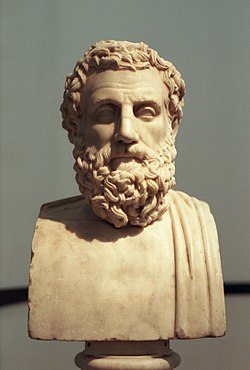Anyway, here it is:
"In our sleep, pain which cannot forget falls drop by drop upon the heart until, in our own despair, against our will, comes wisdom through the awful grace of God."
First, per several sites, the Edith Hamilton translation is "despite," not "despair." Aeschylus is slightly less bullshitting than RFK with "despite." The original idea doubles down on "against our will." Bobby's sounds more poignant.
But, neither is true. In the Christian dual-omni god world of Bobby, this runs straight on into the problem of evil, Aeschylus' original or his misremembered version equally so. A god who can't teach wisdom outside of suicides or homicides is either less than omnipotent or less than omnibenevolent. If one wants to go Calvinist and call this part of double predestination, which RFK wouldn't, of course, that is only more hideous yet.
That said, of course, Hamilton herself mistranslated the last word. In Aeschylus, it's, to give the whole phrase, "the awful grace of the gods."
On that, yes, the Olympians were capricious, and while Aeschylus is treating them (and the Fates and others as well, surely) as a group, they were individually capricious, battling each other, even.
For more on that, and other problems with Hamilton's translation, go here. I quote author Tara Wanda Milligan:
Even more than this, it is perhaps Hamilton’s reconstruction of Athenian tragedy, Americanized to focus on individual “poetically transmuted pain,” that appealed to Robert F. Kennedy. Hallett says that tragedy as conceived by Hamilton, a school headmistress with a master’s degree in classics but no further training, “focused intensely on individual suffering, democratic to the extent that it equalizes, and minimizes differences among, individuals who suffer and exult in their suffering.” A man of forty-two who had witnessed both his elder brothers die unexpectedly (Joe Jr. died while fighting in World War II), Kennedy needed solace and founded it in Hamilton’s writing. “Reading the Greeks was Jackie’s idea but something Bobby was ready for,” writes biographer Evan Thomas, adding that Aeschylus’s words “seemed to be speaking directly to Bobby.”
Going past that, the author notes that Hamilton misconstrues Hellenic Greek tragedy in general. Indeed, the Americanization is tragedy as individualized pathos.
While that's not "the problem of evil," per se, and it's not "theodicy," it is A problem of evil of sorts.
Go back to World War II, where African-American combat deaths, or service short of death, received less valourous recognition than that of Whites. Or look at "Drunken" Ira Hayes.
That then said, going beyond Milligan, Aeschylus appears to be talking about what is at the heart of Greek tragedy: hubris. The "despite" plus "against our will" is basically about stiff-necked humans getting taught a divine lesson through pain and tragedy.
Of course, that ties back to something like the book of Job, where Yahweh eventually says, in essence: "I'm the boss and you're not. Shut up and stop second-guessing me."
Often, though, it goes beyond that to something deeper.
I mean, this is the heart of many multigenerational, familial Greek legends such as the fall of the house of Atreus, tainted, tainted, tainted. (And, none of that is worse than what you'll find in portions of Genesis and Judges.) Usually, this hubris is about offending the gods, violating divinely-backed social or cultural precepts and so forth. In many cases, it's compounded when one precept collides with another, or a precept collides with humaneness.
In this case, it's how original familial sin, slightly parallel to original sin of Augustine, or more parallel to the "third and fourth generation" of the Ten Divarim, puts people in "damned if you do, damned if you don't" situations.
In other words, from a secularist point of view, Aeschylus is still wrong, but not in the way Edith Hamilton and Robert F. Kennedy make him to be.

